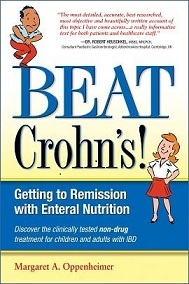Crohn's disease news! Cool digestive facts!
The following article is brought to you by Margaret A. Oppenheimer, author of Beat Crohn's! Getting to Remission with Enteral Nutrition. Check out her blog posts to learn about the latest research on Crohn's disease.
Low-Dose Naltrexone in Crohn's Disease
©2011 Margaret A. Oppenheimer. There's been a lot of buzz about naltrexone as a potential treatment for Crohn's disease. For those who have been eagerly awaiting more news, here's the scoop on the latest trial.1
Who were the participants?
The study recruited patients with moderate to severe Crohn's disease. They were randomly assigned to 12 weeks of treatment with a low dose of naltrexone (4.5 mg per day) or a placebo.
What is naltrexone?
Naltrexone is a medication typically used to treat drug and alcohol addiction. It is being tested in much lower doses to treat Crohn's disease. Naltrexone is an opioid receptor antagonist—it binds to opioid receptors in cells.
What did the researchers running the trial hope to achieve?
There were two main outcomes for the trial. The first was the percentage of patients whose Crohn's Disease Activity Index (CDAI) scores had decreased at least 70 points by the 12th week. Among those treated with naltrexone, 88% achieved this endpoint, compared with only 40% of patients who received the placebo, a highly significant difference.
The second main outcome was mucosal healing, assessed by scoring the degree of inflammation observed visually during colonoscopies and microscopically in biopsies. The patients treated with naltrexone had significantly less mucosal inflammation after 12 weeks of treatment than they had had at the beginning of the study. In contrast, scores of mucosal inflammation didn't improve in the patients given the placebo.
What do these results mean?
The clear differences between the naltrexone and placebo groups, particularly in mucosal inflammation, are promising. They suggest that the medication is having more than a placebo effect. That said, it is not a miracle drug. Only 30% of the patients in the naltrexone group were in clinical remission (CDAI score of <150) after 12 weeks of treatment. The clinical remission rate for the patients in the placebo group is not stated, inevitably raising the suspicion that there was little or no difference in the clinical remission rates between the placebo and naltrexone groups.
How do these results compare with the results of other treatments?
Let's look at two other treatments proven to produce mucosal healing: Remicaid (infliximab) and enteral nutrition. Typically, remission rates are in the 50% to 70% range after 2 to 8 weeks of treatment with enteral nutrition or 1 to 3 doses (up to 6 weeks) of Remicaid. In comparison, Naltrexone is clearly not a quick-acting treatment for dealing with a severe flare. However, it may prove useful for long-term use.
The current study had a 12-week extension during which all the patients, including those originally assigned to the placebo group, received naltrexone.
(1) Those who had received placebo previously showed improvement in symptoms and mucosal inflammation once they were switched over to naltrexone.
(2) Those who had received naltrexone during the first 12 weeks experienced further improvement in CDAI score and endoscopic inflammation during the extension. With regard to microscopically visible inflammation, they maintained their prior improvement but did not experience additional gains.
For all the patients, a placebo effect may have played a role, since they knew they were receiving the active treatment during the second 12 weeks. Still the results of the extension suggest that naltrexone can have a beneficial effect on Crohn's disease during up to six months of use.
It remains to be seen in future studies whether patients will plateau, continue to improve, or lose response after six months of treatment, and whether these promising results can be replicated in a larger group of patients.
This article is brought to you by Margaret A. Oppenheimer, author of Beat Crohn's! Getting to Remission with Enteral Nutrition, the book about the only clinically tested dietary treatment for Crohn's disease. Visit her Crohn's News Blog to read about the latest research on Crohn's disease..
1. Smith JP, Bingaman SI, Ruggiero F, et al. Therapy with the opioid antagonist naltrexone promotes mucosal healing in active Crohn's disease: a randomized placebo-controlled trial. Dig Dis Sci. 2011 Mar 8. [Epub ahead of print]

Available from Barnes & Noble, Amazon, or your favorite independent bookseller.
About the Blogger:
Margaret A. Oppenheimer, the author of this blog, has over ten years of experience as a medical writer. When not digging up the latest news about Crohn's disease, she enjoys reading, visiting museums, and chatting with her computer—she does all her computer work using voice-recognition software. Margaret also belongs to two Toastmasters clubs and enjoys sharing a laugh with the audience.
Like this blog?
If you'd like to comment on posts or find out through status updates when new posts or articles are available, visit Beat Crohn's on Facebook and become a fan.